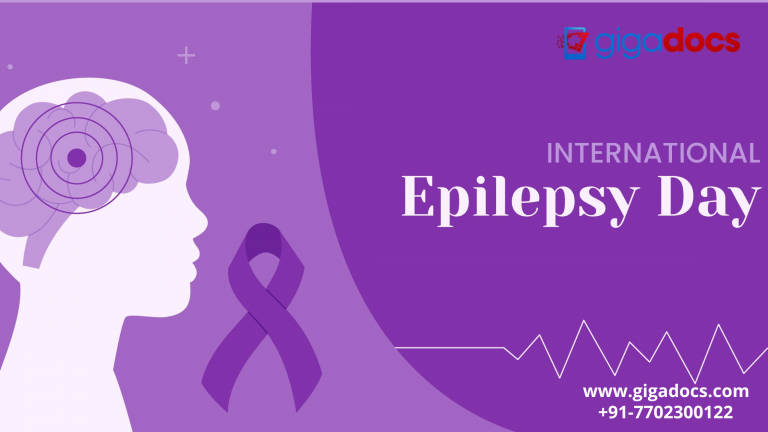Epilepsy affects approximately 50 million people worldwide, making it one of the most common neurological disorders, yet we don’t talk much about it. Why?
To begin, Epilepsy, a neurological disorder, affects the electrical activity in the brain and can cause seizures. However, it’s important to note that the prevalence of Epilepsy varies widely by region, with some areas having much higher rates of the condition than others. In low- and middle-income countries, for example, Epilepsy is often more common due to higher rates of infectious diseases, lack of access to healthcare, and greater exposure to environmental risk factors. On the other hand, in high-income countries, Epilepsy is more prevalent in older adults, who are more likely to develop the condition due to stroke or other age-related brain changes. This Epilepsy Awareness Day let’s bring your awareness to Epilepsy risk, the stigma around Epilepsy, how it can Epilepsy be a contributing factor to Mental Illness, Epilepsy symptoms, diagnosis, and treatment for Epilepsy. And Finally, we bust myths around Epilepsy; let’s get started-
Who is at an Epilepsy Risk?
While epilepsy can affect anyone, some people may be more at risk of developing the condition due to certain factors, such as:
- Family history: Having a family member with epilepsy increases a person’s risk of developing the condition.
- Age: While epilepsy can affect people of all ages, certain types of epilepsy are more common in certain age groups. For example, infantile spasms typically occur in babies and young children, while temporal lobe epilepsy is more common in adults.
- Brain injuries or conditions: People who have experienced brain injuries, infections, or other brain conditions may be more likely to develop epilepsy.
- Gender: Some types of epilepsy, such as absence seizures, are more common in girls and women, while other types, such as temporal lobe epilepsy, are more common in boys and men.
- Environmental factors: Exposure to certain environmental factors, such as lead or carbon monoxide, may increase a person’s risk of developing epilepsy.
It’s important to note, however, that many people with epilepsy have no known risk factors and develop the condition for reasons that are not fully understood. Regardless of the cause, epilepsy can be managed with appropriate treatment and support, allowing people with the condition to lead fulfilling lives.
Why is there a Stigma around Epilepsy?
Despite the high prevalence of epilepsy, there is still a great deal of stigma and misunderstanding surrounding the condition, which can make it challenging for people with epilepsy to access care and support. However, with increased awareness and improved healthcare resources, more and more people with epilepsy are able to receive the care they need to manage their condition and lead fulfilling lives.
How can Epilepsy be a contributing factor of Mental Illness?
Research has shown that people with epilepsy may be more likely to experience mental health problems, such as depression, anxiety, and psychosis. Here are some ways in which epilepsy can be a contributing factor to mental illness:
- Seizures: Epileptic seizures can be distressing and traumatic for people, and can lead to anxiety, depression, and post-traumatic stress disorder (PTSD). People with epilepsy may experience seizures in public, which can lead to social stigma and anxiety.
- Social isolation: People with epilepsy may experience social isolation and stigma, which can contribute to mental health problems. Some people may avoid social situations or feel embarrassed about their condition, which can lead to feelings of loneliness and depression.
- Medications: Some of the medications used to treat epilepsy can have side effects that affect mood and mental health. For example, some anti-seizure medications can cause fatigue, irritability, and depression.
- Brain changes: Epilepsy can cause structural changes in the brain, which can affect mood and behavior. Some studies have found that people with epilepsy may have reduced gray matter volume in certain brain regions, which is associated with a higher risk of depression.
It is important to note that not all people with epilepsy will experience mental health problems and that many people with mental illness do not have epilepsy.
A mental health professional can help identify and treat any underlying mental health issues and provide support for managing epilepsy symptoms. If you or someone you know has epilepsy and is experiencing mental health problems, it is important to seek professional help, download the Gigadocs app to know how you can book a digital consultation.
How to identify Epilepsy | Epilepsy Symptoms
Epilepsy is a neurological disorder characterized by recurrent seizures that are caused by abnormal electrical activity in the brain. Here are some common signs and symptoms of epilepsy:
- Staring spells: Some types of seizures can cause brief periods of staring, in which the person appears to be “zoned out” and unresponsive.
- Loss of muscle tone: Some seizures can cause a sudden loss of muscle tone, resulting in falls or drops.
- Seizures: Seizures are the hallmark symptom of epilepsy. Seizures can manifest in different ways, depending on the area of the brain affected. Some seizures may cause involuntary movements, such as convulsions or jerking of the limbs. Other seizures may cause brief lapses in consciousness, known as absence seizures.
- Aura: Some people with epilepsy may experience an aura before a seizure. An aura is a warning sign that a seizure is about to occur and can take the form of a sensation, such as a smell or taste, or a feeling of déjà vu.
- Confusion or disorientation: After a seizure, some people may experience confusion or disorientation, and may have difficulty remembering what happened during the seizure.
Myths around Epilepsy?
There are several myths around epilepsy, which are often based on misinformation and misunderstanding about the condition. Here are some common myths about epilepsy:
- Epilepsy is contagious: Epilepsy is not contagious and cannot be transmitted from one person to another through contact.
- Epilepsy is caused by demonic possession or a curse: This myth is particularly prevalent in some cultures where superstition is rife. In reality, epilepsy is a medical condition caused by abnormal brain activity.
- People with epilepsy are intellectually disabled: This is a myth that has persisted for years. While some people with epilepsy may have intellectual disabilities, many people with epilepsy have normal or even above-average intelligence.
- All seizures are the same: There are many different types of seizures, and they can vary in severity, duration, and symptoms. Some seizures are subtle and difficult to notice, while others are more dramatic and can cause convulsions.
- People with epilepsy should avoid sports and physical activity: People with epilepsy can participate in sports and physical activity like anyone else, as long as their condition is well-managed and they have the approval of their healthcare provider.
- Epilepsy cannot be treated: While there is no cure for epilepsy, it can be managed with medication, surgery, or other forms of treatment. Many people with epilepsy are able to control their seizures and live normal lives.
- People with epilepsy cannot live independently: This is another myth that is simply untrue. People with epilepsy can live independently and lead productive, fulfilling lives with the right treatment and support.
It’s important to dispel these myths and educate people about epilepsy so that individuals with the condition can receive appropriate care and support, and can be treated with the respect and dignity they deserve.
Diagnosis and Medical Care
We may see improvements in the diagnosis and treatment of epilepsy. Here are some potential developments:
- Improved diagnostic tools: Advances in neuroimaging technology, such as functional MRI and magnetoencephalography (MEG), may make it easier to detect and localize the source of seizures in people with epilepsy.
- Personalized treatment approaches: Precision medicine, which involves tailoring treatment to an individual’s genetic and biological makeup, may lead to more effective and targeted treatments for epilepsy.
- Development of new medications: Researchers are continually working to develop new medications that can better control seizures with fewer side effects.
- Increased access to care: Efforts to improve access to healthcare, particularly in underserved areas, may help more people with epilepsy receive timely and effective treatment.
- Greater awareness and understanding: Education and public awareness campaigns may help dispel myths and reduce stigma around epilepsy, which could lead to improved care and quality of life for people with the condition.
Overall, while there is still much work to be done, the future of epilepsy care looks promising with ongoing research, technology advancements, and improved public awareness and understanding. Let’s understand more about the Diagnosis and Treatment of Epilepsy-
How to Treat Epilepsy | Epilepsy Diagnosis and Treatment
Epilepsy is a neurological disorder that is typically treated with a combination of medications, lifestyle modifications, and in some cases, surgery. The specific treatment plan will depend on the type and severity of epilepsy, as well as the individual’s overall health and medical history. Here are some common treatment options for epilepsy:
- Lifestyle modifications: Certain lifestyle changes can help manage epilepsy, such as getting enough sleep, avoiding triggers that can cause seizures (such as stress or flashing lights), and following a healthy diet and exercise routine.
- Medications: Anti-epileptic medications are often the first line of treatment for epilepsy. These medications work by stabilizing the electrical activity in the brain and reducing the frequency and severity of seizures. It may take some time to find the right medication and dosage, and some people may need to take more than one medication to manage their seizures.
- Surgery: In some cases, surgery may be recommended to remove the part of the brain that is causing seizures, if it can be done safely without affecting important brain functions.
- Ketogenic diet: The ketogenic diet is a high-fat, low-carbohydrate diet that has been shown to be effective in reducing seizures in some people with epilepsy, particularly in children.
- Vagus nerve stimulation: Vagus nerve stimulation is a type of therapy that involves implanting a device under the skin in the chest that delivers electrical impulses to the vagus nerve, which runs from the brain to the abdomen. This can help reduce the frequency and severity of seizures.
A mental health professional can help identify and treat any underlying mental health issues and provide support for managing epilepsy symptoms. It is important to work closely with a healthcare provider to develop a personalized treatment plan for epilepsy.
Book an appointment with Gigadocs only by downloading the Gigadocs App. With Gigadocs you can leverage telemedicine in the management of epilepsy. Here are some ways in which telemedicine by Gigadocs can help:
- Remote monitoring: Telemedicine can be used to remotely monitor patients with epilepsy. This can include tracking seizure frequency, medication adherence, and other important health metrics. Remote monitoring can help healthcare providers detect and address changes in a patient’s condition more quickly.
- Improved access to care: Telemedicine can help increase access to care for patients with epilepsy, particularly those who live in rural or remote areas. With telemedicine, patients can connect with healthcare providers from the comfort of their own homes, reducing the need for travel and making it easier to access care.
- Medication management: Telemedicine can be used to help patients with epilepsy manage their medications. Healthcare providers can use telemedicine to monitor medication adherence and adjust medications as needed. This can help improve seizure control and reduce the risk of side effects.
- Education and support: Telemedicine can be used to provide education and support to patients with epilepsy and their families. This can include information about seizure management, medication side effects, and lifestyle changes that can help improve seizure control.
Gigadocs telemedicine facilities can help improve the management of epilepsy by increasing access to care, improving medication management, and providing education and support to patients and their families. Download the Gigadocs app from-
- IOS App – apple.co/2W2iG4V
- Android App – bit.ly/33AQoRC
To know more e-mail, at info@gigadocs.com




